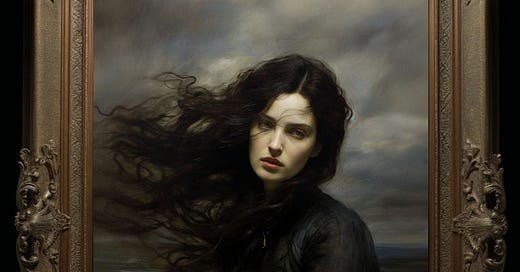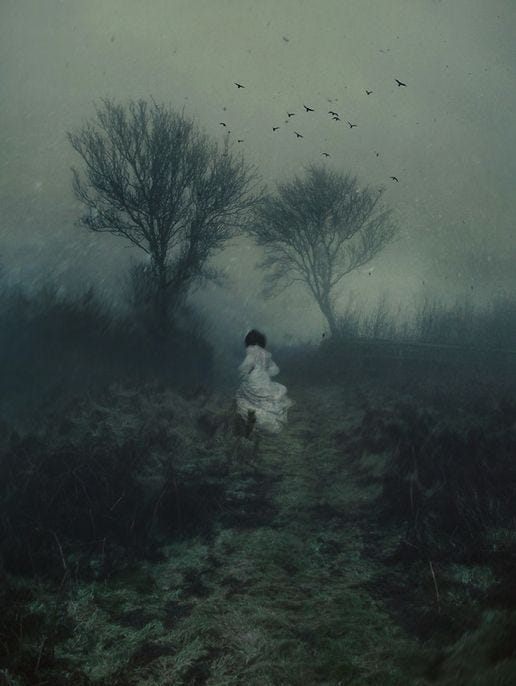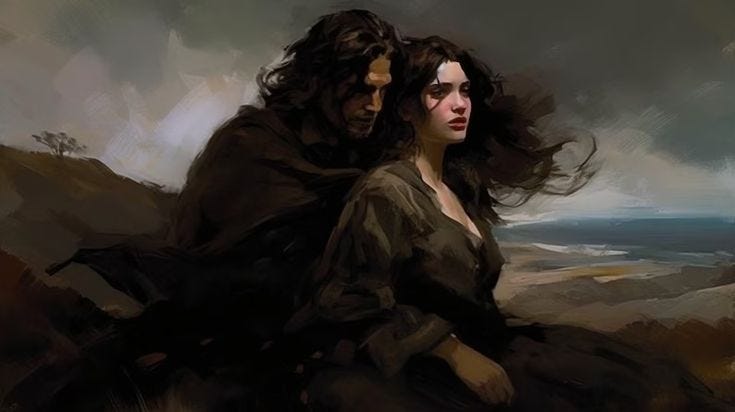Wuthering Heights is depicted as a desolate hilltop, where the earth is hardened, and the wind howls with a cold, relentless bitterness—much like the souls who inhabit it. The blurb on the back of the book suggests that, while often labeled a romance, the novel challenges us to look deeper into its portrayal of physical and psychological extremes. And let’s be honest—many modern relationships don’t look much different, do they, my friend?
There is more to Wuthering Heights than the raw intensity of its antihero, Heathcliff, and the ghostly love that lingers over the windswept moors of Northern England. At its core, the novel is a tale of betrayal and vengeance—betrayal of the self and an endless cycle of retribution that consumes all who dare wade into its depths. The bleak, bitter wind sweeps through the moors, just as it does through the hearts of its characters.
Many 19th-century novels, especially those penned by women, carried undertones of eroticism and the repression of female desire, reflecting the constraints of the Victorian era. Emily Brontë, like her sister Charlotte, wove these themes into her work, capturing the tension between passion and propriety. But has much changed in the 21st century? Are we still longing for that intoxicating blend of physical sensation and eternal connection?
You’d think the men of the manosphere—Andrew Tate and his crew—would have cracked this code by now. But here we are, still trying to figure it out.
Monster Theory suggests that villains are not just figures of horror but reflections of society’s fears, anxieties, desires, and transformations. They embody the tensions of their time, unsettling those around them and often blurring the boundaries between life and death (good and evil). We see this in Frankenstein and Jane Eyre—but in Wuthering Heights, the real monster may not be Heathcliff alone. Catherine Earnshaw is just as monstrous in her own way.
Catherine, or Cathy, as Heathcliff affectionately calls her, carries a wild, childlike energy—unstoppable, mischievous, and untamed. Meanwhile, Heathcliff is the 19th-century embodiment of the 21st-century “bad boy.” An adopted outsider, found by her father in a strange land with an unknown origin, he stands apart from the pale faces of Northern England. Tall, dark, rough around the edges, and dangerously masculine, Heathcliff is seen as a monster, but unlike Cathy, he does not hide his nature—he embraces it.
After Mr. Earnshaw’s death, Heathcliff’s adopted father, fate takes a cruel turn for him. Hindley, Cathy’s brother, strips him of dignity and education, reducing him to a stable boy, and forcing him to harden into a creature of endurance and vengeance. In many ways, Heathcliff is not just a villain but a product of systematic rejection and social discrimination—a man who internalized his pain until it consumed him.
Cathy too, manipulates, torments, and ultimately destroys as much as Heathcliff does.
Love Monstrosity
Many characters in Wuthering Heights struggle to recognize or articulate their emotions—whether love, resentment, or longing. But Heathcliff never hesitates to say exactly what he feels. He does not fear consequences, nor does he soften his cruelty for anyone—except one.
Even Nelly, the housekeeper and narrator, recalls a younger Heathcliff as sullen, silent, and tough—but far from the most dangerous figure in the house. In comparison to Cathy’s wildness and Hindley’s reckless cruelty, Heathcliff—though an orphan and an outsider—was initially the least harmful of them all.
Was Cathy the one who drove him to what he was, or was he always capable of cruelty and vengeance? Nelly describes Cathy’s younger years as:
"She was much too fond of Heathcliff. The greatest punishment we could invent for her was to keep her separate from him: yet she got chided more than any of us on his account. In play, she liked exceedingly to act the little mistress; using her hands freely, and commanding her companions: she did so to me, but I would not bear her tyranny, and the best punishment we could devise for her was to tease her. We needed all our ingenuity to entrap her into a good humour, for a moment: but when she got hold of a knife or a stick, or anything that she could strike with, she had no scruple in striking. She was as wayward as a young goat, though not half so strong: and less patient than her father, beautiful as she was.”
Heathcliff and Cathy mirror themselves. But they are both separated by class and ambitions. Cathy is free, and sees Heathcliff as her equal, in the purest soul-like form if societal limitations didn’t exist. She knows he could never quench her thirst to become one of the most achieved ladies in the neighborhood.
Cathy’s spirit is charming, relentless, and provoking. Emily’s Cathy and Charlotte’s Jane have similar traits of being somewhat wild and constantly questioning authority in their younger years. When her father asks: “Why can’t you be a nice girl? She answers with: Why can’t you be a good father?” This dialogue seems to overreach for a seven-year-old. And provides evidence, that Cathy was disrupting the standards of her society at that age.
Heathcliff finds himself in Cathy and they develop a love that transverses the living and dead. Who wouldn’t want this love? But Emily reminds us it comes at a price. They both are what we could call a modern-day toxic couple. It also jolted a new idea forward, does our love for toxic partners speak more about us, than about them?
Different standards for toxicity
Women often lament the toxic behavior of men, yet emotional and even physical abuse often fail to override the chemical forces that pull us back into their arms—a pattern that plays out repeatedly in Wuthering Heights.
We are raised with different moral expectations. Studies, such as the one published in Ethics & Behavior (2015), show that women score higher than men in moral sensitivity, empathy, and care-based reasoning. I have seen it in my own life—and if you grew up with a brother, you’ve likely seen it too.
Girls are conditioned to be pristine, disciplined, virginistic, and controlled, both in the 19th century and now. I was expected home by 8 PM sharp, while the boys could stay out as late as they pleased. I was monitored—what I ate, what I said, how I behaved—while the boys faced little to no consequences for their actions. We are expected to be good girls—pure, nurturing, devoid of malice or desire. We are raised to be empathetic and nurturing while wasting away our education and struggling with our lack of inclusivity only because of our physiognomy.
Drinking, smoking, straying too far from the expected path—all are smudges on a woman’s reputation. And who would want a spoiled woman?
So naturally, we expected the same from men. We expect them to be strong, disciplined, and morally grounded. But how can they be, when the world has always bent in their favor? How can it be a betrayal if society has set the rules in their favor from the start? We are bred to tolerate bad behavior. And that’s why we love Heathcliff, we are used to seeing such characters in our real world, and we tolerate it. His only redeeming quality of passionate love for Cathy was enough for us to accept his violence and cunning manners.
Heathcliff may be the obvious poster boy for toxicity, but so is Cathy. She too brings out the worst in those around her with her abrupt rage-like behavior, and in a way they mimick each other.
In an attempt to redeem herself, she eventually followed what society expected of her—even if it meant betraying her true self.
Why We Can’t Resist Heathcliff
The fact that we, as readers, are drawn to Heathcliff more than any other man in the novel reveals more about us than it does about him. He is brutal, vengeful, and at times monstrous, yet his unwavering intensity and raw honesty make him compelling in a way that the polite, restrained Edgar Linton never could be.
Heathcliff had no father figure to guide him, no distractions, no social media to scatter his attention. His focus was singular—Cathy. The biggest seduction for any woman, whether she’s a 19th-century aristocrat or a 21st-century brat summer girl: Our brains forego any inkling of destruction when met with few moments of attention. It’s a chemical thing, and we are wired to want a more emotional and intimate connection in a relationship, while men don’t need it as much as we do, and that’s just their chemical thing.
Even when he is brutal, we forgive Heathcliff’s violence because he loves with undivided devotion. Our brains ignore the destruction for the sake of those fleeting moments of attention.
But Cathy? Cathy lets go. She craves a better house, a better life, a better name, so she morphs into someone she hardly recognizes—someone she pretends to be.
And that, perhaps, is the real tragedy of Wuthering Heights. Not just the monstrous love between Heathcliff and Cathy, but the way society forces them to destroy themselves and their houses in the process.
The Monster lives in all of us
The narrator, Nelly, gives both Cathy and Heathcliff a hard time, from the eyes of a perfect devout maid she judges their mischievous and cunning ways. Heathcliff’s duality is showcased multiple times; he can be vicious and revengeful but capable of passionate love for his Cathy. He does not live in pretenses, as the other characters do. He doesn’t betray his nature. Hindley grew despaired as time went by and took to drinking as his coping mechanism. He flung his only baby son, Hareton, into the air down the stairs while intoxicated but the child reached Heathcliff’s hand safely. Nelly remembers:
“That in any other day he would have tried to remedy the mistake by smashing his skull on the steps; but we witnessed his salvation.”
Heathcliff has a way of bringing out the worst in those around him—or perhaps he merely reveals their true nature. Hindley harbors deep resentment toward him, not just for being an outsider, but for being favored by their father. That hatred festers, consuming him until he spirals into a life of gambling and alcoholism, destroying himself in the process.
Cathy, too, is reckless and untamed in Heathcliff’s presence—they are inseparable, their bond forged in defiance of the world around them. Together, they flee to the moors at every slight inconvenience, escaping reality, and running from the expectations placed upon them. They challenge authority, mock social structures that favor wealth and class, and refuse to conform.
Until Cathy meets Edgar Linton.
Edgar Linton is the more well-groomed, the more educated, the wealthier, and a better match for her. She transforms under Edgar, refined and controlled, and careful about her ways. After spending her time with the Lintons, she realizes the status of Heathcliff and mocking him cruelly:
“What are you sulky for? It was only you that looked odd- if you wash your face, and brush your hair, it will be alright, But you are so dirty!”
Cathy longs to fit into Linton’s polished world, but her true nature slips through when, in a moment of unchecked rage, she slaps Nelly across the face—in front of Edgar. Rather than being repulsed, he proposes his love to her. Another testament to Cathy’s ability to bring out the hidden nature of those around her.
Cathy watches the potential of a stable life with Edgar Linton, one of prestige, money, and honor. She betrays her heart, goes against her own monster nature, and confesses to Nelly:
“My love for Linton is like the foliage in the woods: time will change it, I'm well aware, as winter changes the trees. My love for Heathcliff resembles the eternal rocks beneath: a source of little visible delight, but necessary. Nelly, I am Healthcliff! He's always, always in my mind: not as a pleasure, any more than I am always a pleasure to myself, but as my own being.”
The Price of Vengeance
Emily Bronte here shows us the life less traveled and the consequences of it. By betraying own her spirit, Cathy marries a good and earnest man. In theory, she should have been happy—loved, secure, and respected. She did love Edgar but her soul forever is in dearth, something amiss and longing for the unconstrained and morally corrupt man she once loved. Cathy did what she was expected to do, but at the expense of her soul. Heathcliff and Cathy could not be together, creating havoc in heaven and hell.
Heathcliff knows the weaknesses of the people around him, whether it’s Hindley or Edgar. He pushed Edgar to the point that he got struck by him. An act that Edgar could never have fathomed, another reason why the monster theory applies here. Edgar Linton and Hindey both hide behind the magnanimity of their house names and wealth. But Heathcliff and Cathy remind them of their true monsters hidden inside.
He was also aware of Edgar’s sister, Isabella’s feelings for him and exposed his plans shamelessly yet she was awestruck by him and wanted him to devour her. He showed visible signs of physical abuse when he even threw a pup against a way, right in front of her. He warns her of her demise:
"You’d hear of odd things if I lived alone with that mawkish, waxen face; the most ordinary would be painting on its white the colors of the rainbow, and turning the blue eyes black, every day or two. They shouldn’t seem much to regret; married a pitiful alternative they’d fix on, but it does not include being turned into a dog, and kicked like a dog. And that is what I should like well to do."
The signs were always there. Red flags waving like storm-tossed banners across the moors, yet Isabella chose to look away. I can almost picture the man from TikTok sprinting through the moors waving a red flag, screaming to run away from him. But Heathcliff did not deceive her—he laid his darkness bare. He warned her of the cruelty he was capable of, and still, she walked willingly into his grasp. Perhaps she hoped he would change, or perhaps, on some level, she recognized herself in his madness.
The dispute between Edgar and Heathcliff is too much for Cathy, the present, and past. The duty and desire. She could no longer be stranded between the two. Cathy is finally unable to endure the sadness and is haunted by premonitions and forced to live as a ghost in her afterlife, until Heathcliff joins her, and dies at childbirth leaving a child, Catherine Linton. Her ghost forever haunts the moors. Heathcliff refuses to have his monster mirror live outside his current realm and curses her soul:
“Catherine Earnshaw, may you not rest as long as I am living. You said I killed you—haunt me then. The murdered do haunt their murderers. I believe—I know that ghosts have wandered the earth. Be with me always—take any form—drive me mad. Only do not leave me in this abyss, where I cannot find you! Oh, God! It is unutterable! I cannot live without my life! I cannot live without my soul!”
Heathcliff, consumed by vengeance and obsession, returns to Wuthering Heights with a singular purpose: to take everything that was once denied to him. He seizes control of the estate, forcing Hareton to live as the outcast that he himself was once made to be. The cycle of cruelty continues—Hareton, though hardened and rough, remains fiercely loyal to his tormentor, his biggest weakness that Heathcliff exploit.
Through a series of manipulations and calculated moves, Heathcliff strips Catherine (Cathy and Edgar’s daughter) of her inheritance, leaving her powerless. He achieves what he set out to do—claiming Wuthering Heights as his own—but revenge does not bring peace.
Instead, it devours him.
Tormented by Cathy’s absence, Heathcliff descends into madness, haunted by the love that refuses to die. His obsession drives him to dig up her grave, desperate to feel her presence one last time.
His remarkable ability to see through people also is shown when he describes Hareton claiming that if he didn’t treat him this harshly, he wouldn’t love him either. Hareton too was at the mercy of Heathcliff’s games, and saw cruelty as love:
“He seems to covet my good opinion, as if I were his deity. And yet, if I had done no more, and no worse, than any other well-meaning father would have done, he would have cursed me, and hated me for heeding him.”
Catherine Linton and Hareton, now at the same status, fall in love organically, and warmth fills through the moor finally. The world is balanced.
Some might believe it's Heathcliff’s rawness, his unrelenting vengeance, and his obsessive love for Cathy that make him so irresistible—even in death, he refuses to let her go. I couldn’t help but chuckle at the thought: the kind of love women longed for in the 19th century seems just as absent now as it was then.
I always search for lessons in the books I read, hoping to take something meaningful from them. But Wuthering Heights didn’t teach me—it left me longing. I’m not just mourning the tragic fate of its two main characters, but something deeper.
Perhaps this kind of love—the wild, unearthly, all-consuming love—is impractical. Perhaps it exists only for those willing to battle the madness that comes with it.
This review marks the beginning of my journey into revisiting beloved classics. I'll be sharing weekly reflections and drawing modern parallels to timeless works throughout the year. I’d love to hear your thoughts, so feel free to leave a comment! If you’d like to stay updated, don’t forget to subscribe for weekly newsletters filled with insights and more.








I read Wuthering Heights about 10 years ago, but your essay brought back the memories of reading it. Heathcliff is such a strangely alluring character that goes far beyond the typical “bad boy” trope of the 21st century. I particularly enjoyed how you spoke about Cathy’s own monstrosity as well. The Gothic Romanticism of this novel exposes the inner monsters all humans have. Great essay!
thank you for so elegantly capturing Heathcliff’s complexity and intensity. He is by far one of my favorite literary characters and so complex in design. I always like Emily more than her sisters, and Wuthering Heights is, in my opinion, leagues beyond Jane Eyre but somehow doesn’t receive near as much attention. I’m interested to read more about your journey through the classics.